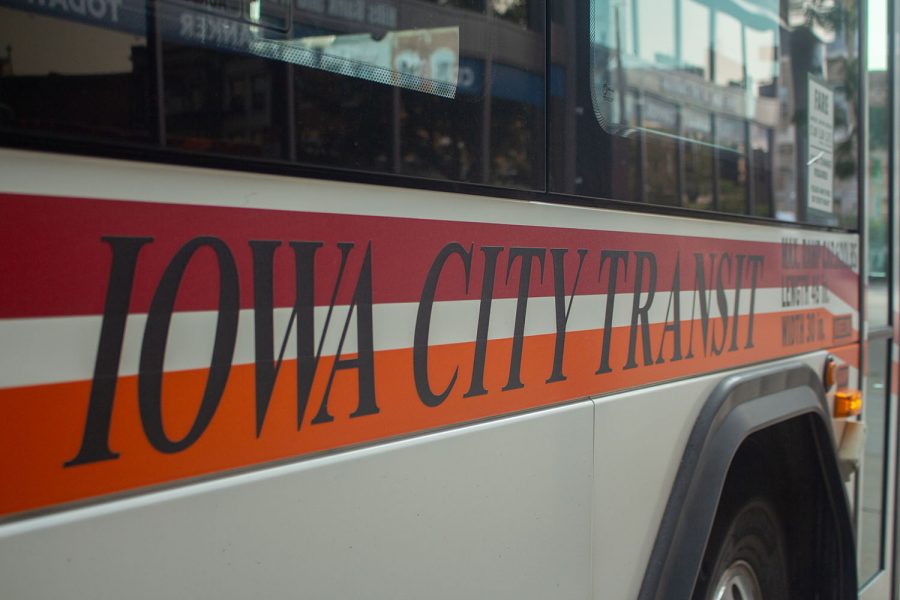Transportation committee advocates for longer bus hours, universal bus passes
A more accessible Iowa City-Coralville bus system would significantly benefit low-income workers, according to a letter the committee sent to the Iowa City City Council.
Iowa City Transit bus as seen on Sept. 21.
September 21, 2020
The Johnson County Community Transportation Committee is recommending longer bus hours, universal passes, and service on Sundays to better serve low-income residents. The committee sent their suggestions in a letter to the Iowa City City Council on Sept. 8, ahead of a presentation on planning the future of public transit at the council’s Oct. 6 work session.
Committee intern Maya Sims, who wrote the letter, said a study the committee did emphasized some of the current obstacles many low-income workers face when using local bus systems.
“These observations are based on our 2015 research that we did, which just kind of outlined a lot of the disparities in the system,” Sims said. “And with that, we have come up with three immediate goals. There are obviously lots of improvements to transit systems that could be made, but these three we think would have the biggest impact.”
Of those who participated in the survey, 56 percent of them earned less than $10,000 per year, according to the committee’s website. The survey found that the biggest issue respondents had with the current bus system is that it doesn’t run when they need it, especially for residents working shifts late at night or early in the morning.
“These three policy changes that we’re asking for are really targeted and would benefit people who work second shifts, people who work third shifts, people who work on the weekends, and low-income and disabled workers in general,” Sims said.
RELATED: Iowa City buses won’t charge a fare
Committee President Jeremy Endsley said the committee is not proposing an expansion of the current services, but rather a more comprehensive plan allowing for better access.
“We agree with the city council that it wouldn’t make sense to expand the current transportation service,” he said. “But we think they could do a better job with smart transit and planning for smaller trips, maybe something on demand.”
Endsley said a primary concern is the safety of residents because of a lack of bus services that operate late at night.
“More than half of the people we surveyed were people of color and they depended on transit systems as well and to get to work,” Endsley said. “People working in factories or hotels or food service get off late at night and then have to walk home because they don’t have a bus ride. We just think that it’s not safe from a public safety standpoint for people to be walking on the highway home at night from their factory jobs.”
Iowa City City Councilor Laura Bergus said ridership on buses was down somewhere around 60 percent because of COVID-19. One of the big challenges now, she said, is trying to see if that number will rebound and how that affects future planning.
Bergus said the way public transportation receives its funding can be an additional restriction.
“I know one of the issues that we’re dealing with is just that transit is what’s called an enterprise fund with the city,” Bergus said. “And so, enterprise funds are built to be self-sustaining so any expenditures have to be based on revenues that come into that fund, so it’s not like property taxes are paying for transit.”















